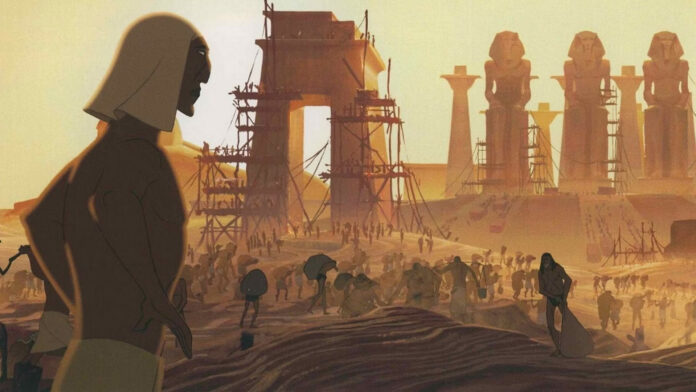The Prince of Egypt released 25 years ago this year. A quarter century later, it remains one of the greatest biblical epics created on film. With careful discernment and conversation with children, this film can offer a powerful visual of God’s incredible power.
This animated adaptation of the story of Moses and the exodus gets a lot right. It also gets a few things wrong. This is pretty much what could be said of any Hollywood adaptation of the Bible.
Films like this prompt us to consider an important question: What sort of creative license should we be willing to accept when it comes to biblical adaptations?
Truth That Sparks Imagination
Part of what makes The Prince of Egypt powerful is that it employs show-stopping music and compelling visuals to help guide its story. Sunday school flannelgraphs can only go so far in helping us imagine the breadth of God’s power on display in the exodus story. The use of these combined elements serves not as a pen to rewrite the story but as a lens by which to view it in a creative way.
Films like this prompt us to consider an important question: What sort of creative license should we be willing to accept when it comes to biblical adaptations?
The film opens with a sequence that feels ripped out of the opening of Les Misérables. Slaves are worked and whipped to the sound of a full orchestra playing “Deliver Us,” an epic song of Israel crying out to God. We learn time and time again in Exodus that God’s chosen people are quick to complain when things are difficult. Yet this opening song displays a powerful balance of faith and uncertainty. We can still trust God to deliver us even as our agonizing yearning for help is real and expressed.
Later highlights include the hair-raising music cue that introduces the burning bush and the jaw-dropping majesty of the parted Red Sea. As a kid, watching The Prince of Egypt helped inspire my imagination and encouraged me to embrace the reality that my brain could never begin to scratch the surface of comprehending God’s full power.
The film does an excellent job of exploring the character of Moses (voiced by Val Kilmer). In Exodus 3, it’s clear Moses is only an echo of the true Deliverer who would one day come. He’s flawed and obviously not thrilled with what God is calling him to do. When God appears in the burning bush, Moses denies the wisdom of God’s choice three different times, ultimately leading to Aaron’s involvement to speak on his behalf. While the film doesn’t include the call of Aaron, it does make clear that Moses is more concerned with his own strength than with the strength of God on display through him. It’s an important reminder of our own temptation to doubt God’s ability to use us.
Scripture Must Come First
When adapting an existing story to film, it’s important to stay true to the source material. However, even when a film gets a number of things right, it can be tough to look past glaring inaccuracies.
Take another film about the exodus story, for example. In Cecil B. DeMille’s The Ten Commandments (1956), Moses isn’t the hesitant and unsure servant who comes to find courage in the power of God. He’s a courageous and wise hero played by the strong-jawed Charlton Heston. While it may seem like a small change, it can make a substantial difference in how audiences view this biblical story. It quickly becomes less about God working in those who are weak and broken and more about how God chooses those who are already strong and capable of leading by themselves.
So where does The Prince of Egypt miss the mark? Some story additions are questionable at best.
Every film needs a dramatic inciting incident. In this film, that moment is Moses discovering who he really is, a Hebrew who was sentenced to die by Pharaoh. While we don’t know for sure, most scholars believe Moses would have been aware of his heritage, having been nursed and cared for by his Hebrew mother for the early part of his life (Ex. 2:6–10).
Another of the film’s questionable storylines is the close relationship between Moses and the new Pharaoh (voiced by Ralph Fiennes)—something never referenced in Scripture. This confusing choice turns Pharaoh into a character who demands a certain level of empathy from Moses and the audience.
Finally, the catchy main song, “When You Believe” (a version of which was released by Whitney Houston and Mariah Carey), has a big issue at its core. The chorus of the song declares, “There can be miracles when you believe. . . . Who knows what miracles, you can achieve / When you believe.” This may sound nice and inspiring, but in reality, God is going to do what God is going to do.
God doesn’t depend on our belief to perform his wonders, and we aren’t the ones who catalyze those wonders (Ps. 50:10–12; Acts 17:24–25). As you watch the film with your children, especially if they start singing this catchy song, it may be worth discussing the important theological nuance.
Creative License in Biblical Storytelling
If you’re a fan of books like The Lord of the Rings or Harry Potter, you’ve experienced firsthand the impossibility of full accuracy when translating a story into a film. People will read books in small chunks over days or months but will only sit to watch a movie for a two- to three-hour stretch. This means writers adapting from page to screen must selectively convey the most important character elements and story beats that stay true to the source narrative, even as they find ways to keep an audience engaged for an uninterrupted few hours.
The same principle applies to adapting biblical stories. Do we expect biblical adaptations will only use dialogue explicitly taken from the pages of the Bible? Is there no leeway to fill in the details of what a Bible character’s personality might have been like, as long as the creative liberties taken don’t contradict anything asserted in Scripture?
Consider any recent Bible adaptation on screen: Darren Aronofsky’s Noah, Ridley Scott’s Exodus: Gods and Kings, or Dallas Jenkins’s The Chosen. Each of these works has inspired much conversation and critique, often focused on the notable additions or unique interpretations of Bible characters or scenes. This sort of critique is fair—especially when an instance of creative liberty with the biblical text has problematic theological implications. But we can sometimes be so concerned with word-for-word, beat-for-beat accuracy that we miss the value in these works to bring the pages of Scripture to new audiences and ultimately point people back to the Bible.
We can be so concerned with word-for-word, beat-for-beat accuracy that we miss the value in these works to bring the pages of Scripture to new audiences and ultimately point people back to the Bible.
If you’ve ever watched a film that says “based on a true story,” you’ll likely wonder at different moments in the movie, Did it really happen that way? One of the best things about biblical stories on screen is that they often prompt us to ask, “Is that really in the Bible?” or pique our interest about what exactly Scripture does say about this character or that scene.
When Noah was released in 2014, it drew plenty of ire from Christians for Aronofsky’s wild take on the Genesis narrative. But it also sent audiences to Scripture, with YouVersion reporting a 300 percent increase in people opening Genesis 6 in the days after Noah released.
This is the power of God’s story. No matter who tells it and no matter how wrong an adaptation may be, audiences intuitively know the source material is worth checking out for itself.
In this way, bringing the stories of Scripture to the screen can serve as powerful conversation starters with believers and unbelievers alike: What does the Bible actually say about this, and how does this movie or TV rendering interpret it? Does the story on screen evoke a sense of wonder or curiosity about God? Does it lead me to think about things I’ve never considered about the story when I’ve read it in my Bible? Does it prompt me to ask better questions and trust God more deeply? Is my heart stirred to worship God?
These are some of the questions you might ask as you watch The Prince of Egypt or any other biblically inspired movie or TV series. As Christians, we shouldn’t expect to love or agree with everything Hollywood produces that takes the Bible as its source material. But that doesn’t mean we shouldn’t celebrate what we can about these works and invite others—our kids, our nonbelieving friends or loved ones—to watch and discuss with us.
So while it may not be perfect, The Prince of Egypt offers more than a heart-pumping soundtrack and masterful visuals; it presents a signpost that points back to Scripture for anyone whose heart is moved by the power of God’s story.




